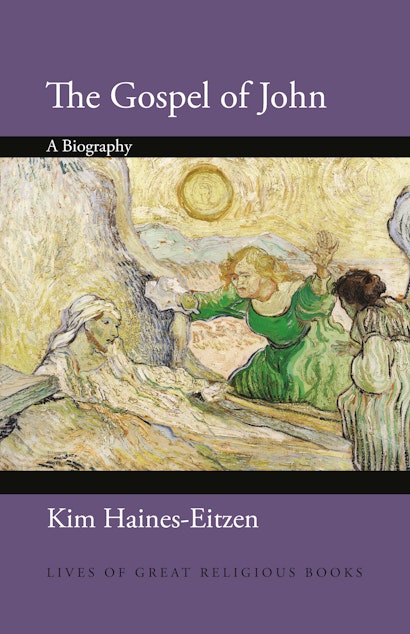Written some two thousand years ago, the Gospel of John is the only Christian Gospel to place Jesus at the creation of the world, and the only one where we find the stories of the raising of Lazarus, the woman taken in adultery, and the changing of water into wine at the wedding in Cana. The Gospel of John also points an accusing finger at Jesus’s Jewish opponents and has been used by medieval crusaders, Protestant reformers, and white supremacists to legitimize antisemitic violence. Kim Haines-Eitzen traces the legacy of this complex, beautiful, and at times deeply troubling work, from its composition in the late first century to its enduring power today.
Haines-Eitzen sheds light on the book’s reception by early Christian gnostic and patristic commentators, its use in the Crusades and Reformation, its revered status among American evangelicals, and the many ways it has inspired novels, films, music, and art. The earliest papyrus fragment of an identifiably Christian Gospel is a fragment of John, and John is the only canonical Gospel that depicts Jesus as a savior who teaches openly about his divinity. Haines-Eitzen shows how John simultaneously carries a message of inclusion and intolerance, and how its story teaches us about the nature and enormous influence of scriptural religions.
Compelling and provocative, The Gospel of John reveals how this dynamic, malleable biblical work has both unified and divided Christians over centuries of translation, interpretation, and creative reimagining.
Kim Haines-Eitzen is the Hendrix Memorial Professor of Early Christianity and Early Judaism at Cornell University. Her books include Sonorous Desert: What Deep Listening Taught Early Christian Monks—and What It Can Teach Us (91ÌÒÉ«) and The Gendered Palimpsest: Women, Writing, and Representation in Early Christianity. She appeared in National Geographic’s The Story of God with Morgan Freeman.
32805
“Kim Haines-Eitzen traces the remarkable journey of one of Christianity’s most enigmatic texts, from its earliest fragments to its enduring cultural and theological afterlives. In engaging fashion and with scholarly depth, she explores how the Gospel of John was created, contested, and cherished across centuries, appearing in everything from ancient amulets and early Christian art to contemporary media. This accessible and erudite biography invites readers into the vibrant and evolving legacy of a Gospel that continues to shape imagination and belief.”—Robyn Faith Walsh, author of The Origins of Early Christian Literature
“For two thousand years, the Gospel of John has shaped how millions have understood Jesus, salvation, truth—and one another. Its words ripple through Christian dogma and debate, devotion and division. In this inviting book, Kim Haines-Eitzen guides readers through that complex legacy with clarity and warmth, unafraid to highlight both its beauty and its burdens. The result is a thought-provoking study, one that illuminates not only the enduring power of a sacred text, but the even more profound and dangerous power of those who read it.”—Hugo Méndez, author of The Gospel of John: A New History
“There is no other book comparable to this one. Haines-Eitzen presents a biography of the Gospel as a sustained and highly engaging narrative, providing readers with a great deal of in-depth yet accessible information about its history and the debates surrounding it.”—Timothy Beal, author of The Book of Revelation: A Biography
“An accessible exploration of the Gospel of John, its histories, meanings, and legacies. Haines-Eitzen traces the book as both a narrative with a plot that can be interpreted and a book that was copied, envisioned, and transformed.”—Jennifer Knust, coauthor of To Cast the First Stone: The Transmission of a Gospel Story


